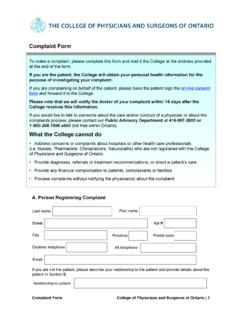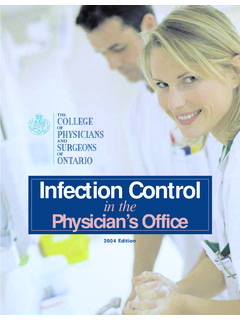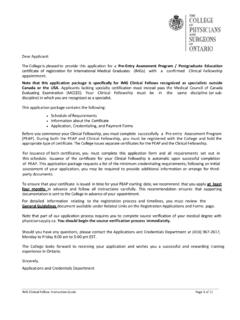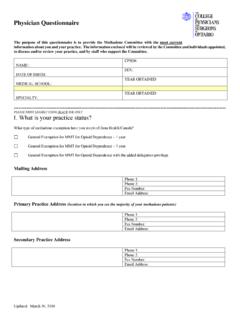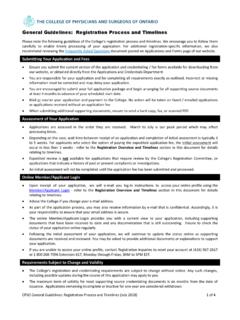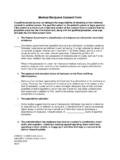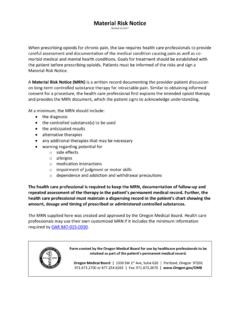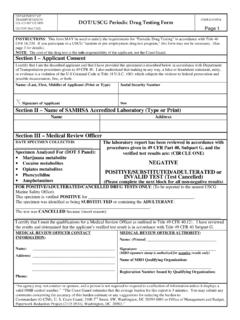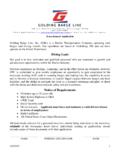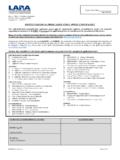Transcription of Marijuana for Medical Purposes - cpso.on.ca
1 College of Physicians and Surgeons of Ontario POLICY STATEMENT #8-16. Marijuana for Medical Purposes APPROVED BY COUNCIL: May 2002. REVIEWED AND UPDATED: November 2005; April 2006; March 2015; December 2016. PUBLICATION DATE: Issue 1, 2015. KEY WORDS: Marijuana ; Cannabis; Tetrahydrocannabinol (THC); Prescribing; Licensed Producer; Assessment; Consent; Dosage; Abuse, Misuse and Diversion; Fees. RELATED TOPICS: The Practice Guide: Medical Professionalism and College Policies; Block Fees and Uninsured Services; Complementary/Alternative Medicine; Consent to Medical Treatment; Prescribing Drugs; Telemedicine. LEGISLATIVE REFERENCES: Access to Cannabis for Medical Purposes Regulations, SOR/2016-230; R. v. Mernagh, 2011 ONSC 2121; Regulated Health Professions Act, 1991, SO. 1991, c. 18.; Health Professions Procedural Code, Schedule 2 of the Regulated Health Professions Act, 1991, 1001, ; Ontario Regulation 114/94 made under the Medicine Act, 1991, 1991, ; Health Care Consent Act, 1996, 1996, c.
2 2, Sched. A. REFERENCE MATERIALS: Health Canada, Information for Health Care Professionals: Cannabis (marihuana, Marijuana ) and the cannabinoids; College of Family Physicians of Canada, Authorizing Dried Cannabis for Chronic Pain or Anxiety: Preliminary Guidance;. Kahan, Meldon, et al. (2014). Prescribing Smoked Cannabis for Chronic Noncancer Pain: Preliminary Recommendations. Canadian Family Physician, 60, 1083-1090. COLLEGE CONTACTS: Physician Advisory Service CPSO Policy Statement 2. Marijuana for Medical Purposes INTRODUCTION Practice Guide, and take into account the best available evidence regarding the Medical use of The Government of Canada's Access to Cannabis Marijuana . for Medical Purposes Regulations (ACMPR)1 es- tablish the legal framework that enables patients to obtain authorization to possess Marijuana for PRINCIPLES. Medical Purposes . The key values of professionalism articulated in Under these regulations, physicians have pri- the Practice Guide compassion, service, altru- mary responsibility for the decision to authorize ism and trustworthiness form the basis for the patient use of Marijuana for Medical expectations set out in this policy.
3 Physicians Physicians enable patients to access a legal embody these values and uphold the reputation supply of Marijuana by completing a Medical of the profession by: document that functions like a conventional prescription. 1. Acting in the best interests of their patients;. 2. Demonstrating professional competence, While conclusive evidence regarding the safety which includes maintaining the Medical and effectiveness of Marijuana as a Medical knowledge and clinical skills necessary to treatment is limited, many patients, physicians, prescribe appropriately;. and researchers have voiced support for the 3. Collaborating effectively and respectfully cautious and compassionate use of Marijuana , with patients, physicians and other health- particularly where other therapeutic options care providers;. have been exhausted and failed to alleviate the 4. Avoiding or appropriately managing conflicts patient's symptoms.
4 Furthermore, court rulings of interest;5 and have required reasonable access to a legal source 5. Participating in the self-regulation of the of Marijuana for Medical Purposes when autho- Medical profession by complying with the rized by a expectations set out in this policy. In keeping with the College's mandate to serve and protect the public,4 this policy sets out purpose & SCOPE. expectations for physicians relating to the pre- scribing of Marijuana for Medical Purposes . This policy sets out the College's expectations of all physicians who prescribe Marijuana for These expectations are grounded in the prin- Medical Purposes . ciples of Medical professionalism set out in the 1. Access to Cannabis for Medical Purposes , SOR/2016-230. 2. The ACMPR authorize both physicians and nurse practitioners to prescribe Marijuana for Medical Purposes ; however, to date the College of Nurses of Ontario has not permitted their members to prescribe.
5 3. R. v. Mernagh, 2011 ONSC 2121. 4. S ection 3(2) of the Health Professions Procedural Code, Schedule 2 of the Regulated Health Professions Act, 1991, 1001, (hereinafter HPPC). 5. F or more information on conflicts of interest, please see Part IV of the General, O. Reg., 114/94, enacted under the Medicine Act, 1991, 1991, c. 30 (hereinafter Medicine Act, General Regulation). 2 CPSO Policy Statement TERMINOLOGY POLICY. Marijuana : Throughout this policy, the terms It is the College's position that the Medical Marijuana and Marijuana for Medical pur- document required under the ACMPR is poses should be understood to mean not only equivalent to a prescription. dried Marijuana , but also any other form of Marijuana that is legally permitted by the cur- Physicians who prescribe Marijuana must rent legislation. comply with the expectations set out in this policy as well as the expectations and Medical document: The ACMPR require that guidelines for prescribing that are set out patients obtain a Medical document completed in the College's Prescribing Drugs policy.
6 By an authorized healthcare practitioner in Physicians must also ensure compliance with order to access a legal supply of Marijuana the ACMPR and any other relevant College for Medical Purposes . The Medical document policies, including, but not limited to, the contains information that would normally be Dispensing Drugs, Complementary/Alterna- found on a prescription, including the patient's tive Medicine, and Telemedicine policies. name, the physician's name and CPSO number, the daily quantity of Marijuana to be used by the patient, and the period of use, among other 1. Before Prescribing Physicians must always practise within the limits of their knowledge, skills and judgment7, Prescription: Throughout this policy, the term and never provide care that is beyond the scope prescription should be understood to include of their clinical As with any treat- the completion of a Medical document in ac- ment, physicians are not obligated to prescribe cordance with the ACMPR.
7 Marijuana if they do not believe it is clinically appropriate for their Assessing the appropriateness of Marijuana for the patient Before a physician may prescribe Marijuana , he/she must carefully consider whether it is the most appropriate treatment for their As part of this process, physicians must weigh the available evidence in support of Marijuana 6. Section 8 of the Access to Cannabis for Medical Purposes Regulations. 7. Sections 2(1)(c), 2(5), O. Reg. 865/93, Registration, enacted under the Medicine Act, 1991, 1991, ; Changing Scope of Practice policy; The Practice Guide. 8. This expectation applies to all non-emergent situations. In emergency situations, physicians may be permitted to act outside their scope of expertise in some circumstances. See the Physicians and Health Emergencies policy for more detail. 9. Physicians may sometimes have difficulty addressing patient disagreement with a decision not to prescribe Marijuana .
8 Recommendations for com- municating with patients about this decision can be found in Kahan, Meldon, et al. (2014). Prescribing Smoked Cannabis for Chronic Noncancer Pain: Preliminary Recommendations. Canadian Family Physician, 60, 1083-1090. 10. While conclusive evidence regarding the safety and effectiveness of Marijuana is currently limited, there are a number of resources physicians can consult for more information. These include, among others: Health Canada's Information for Health Professionals webpage; the College of Family Physicians of Canada's Authorizing Dried Cannabis for Chronic Pain or Anxiety: Preliminary Guidance; and Kahan, Meldon, et al. (2014). Prescribing Smoked Cannabis for Chronic Noncancer Pain: Preliminary Recommendations. Canadian Family Physician, 60: 1083-1090. Physicians must be mindful that resources may become outdated as further research is undertaken in this field.
9 CPSO Policy Statement 3. Marijuana for Medical Purposes against other available treatment options, older adults for Marijuana -associated harms, including the oral and buccal11 pharmaceutical including suicidal ideation, illicit drug use, form of cannabinoids. cannabis use disorder, and long-term cogni- tive Given the potentially severe Physicians must also consider the risks associ- nature of these risks, physicians must not pre- ated with the use of Marijuana , which may scribe Marijuana to patients under the age of include, among others, a risk of addiction, the 2515 unless all other conventional therapeutic onset or exacerbation of mental illness, includ- options have been attempted and have failed to ing schizophrenia, and when smoked symp- alleviate the patient's symptoms. toms of chronic Even after all other conventional therapeutic Physicians are expected to comply with the options have been exhausted, physicians must applicable standard of practice when assess- still be satisfied that the anticipated benefit of ing the risk of Marijuana to their patients and Marijuana outweighs its risk of harm.
10 Take such steps as are clinically indicated in the specific circumstances of each case to mitigate Obtaining consent those risks. The published literature with re- In order to authorize any therapeutic interven- spect to Marijuana provides some general guid- tion, physicians must always obtain valid and ance as to some of the recommended compo- informed consent in accordance with their nents in such a risk assessment. These include, legal obligations16 and the College's Consent to among others, an assessment of each patient Medical Treatment policy. for their risk of addiction and substance diver- sion,13 and an assessment of risk factors for In keeping with these obligations, physicians psychotic disorders, mood disorders, and other who prescribe Marijuana must advise patients mental health issues that may be affected by about the material risks17 and benefits of mari- the use of Marijuana . juana, including its effects and interactions, material side effects, contraindications, precau- Prescribing to patients under the age of 25 tions, and any other information pertinent to its Current evidence strongly suggests that use.

